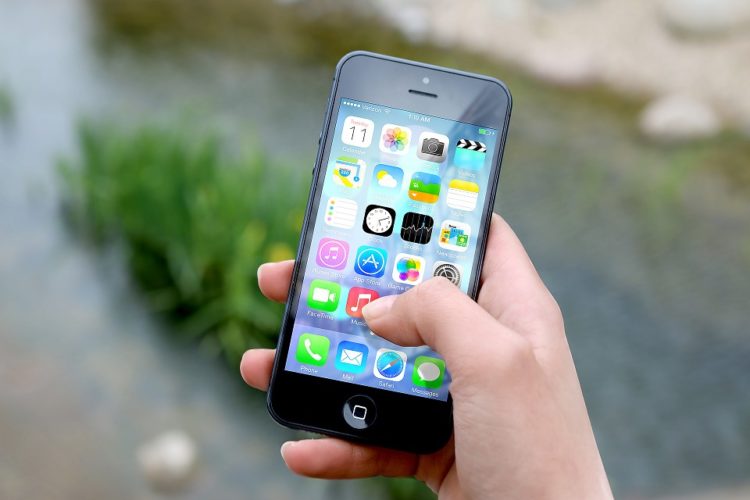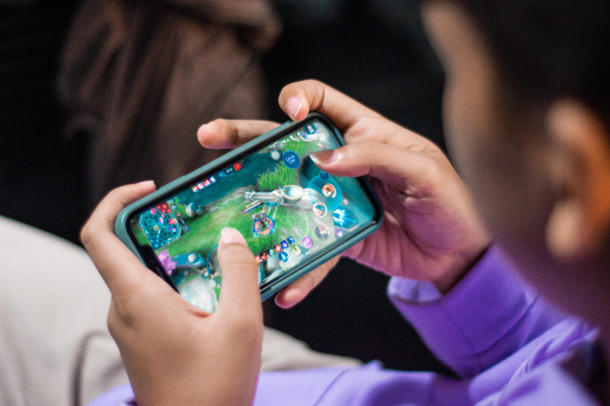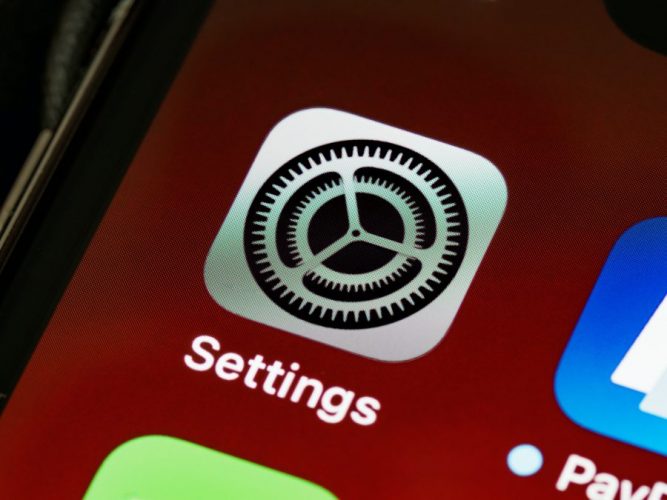iOS Games
Why Real Money Gambling Apps Target iPhone Users

The gambling industry in general has come a long way since the first online casino opened its virtual doors in 1996. Back then, people were blown away by the dozens of games that were offered and with the convenience of being able to play at home. 20 years later, the landscape has almost completely changed. Now people are used to online betting sites offering hundreds of games ranging from slots and table games to sports wagering and peer-to-peer betting. They are also used to being able to access all of these games on their mobile devices. No longer do online players need to sit in front of their desktop computers. Now they can get into the action no matter where they are as long as they have a mobile device and an internet connection. That sure makes it easier to endure those long Sundays visits with the in-laws!!
Some online gambling operators got ahead of the curve a few years ago when they started to offer mobile betting platforms but that feature is now standard. Since close to 98% of all mobile devices have either iOS or Android operating systems, online betting sites mainly offer apps that cater to those two groups. What’s the difference between the two operating systems? Well, that’s a story for another day. However, it was recently estimated that around 70% of online sports bettors place bets using their mobile devices while over half of online casino players have used betting apps. These figures are bound to increase.
What Are The Best iPhone Betting Apps?
There are loads of great betting apps for iPhone users but finding the best one for you depends on what type of mobile betting you want to do. Let’s break it down:
iPhone Poker Apps: PokerStars is the biggest online poker site in the world and they have an excellent iOS app that can be downloaded at their site. It lets iPhone users play almost any variation of poker that you could imagine. The graphics are superb and the games run smoothly. Partypoker is also a very popular poker site and they have a great app for iPhones too. It’s not hard to find a top-rated iPhone poker app for real money players.
iPhone Casino Apps: If you are looking for a real money casino app for your iPhone then you will love the Coral Spin Casino iOS app. Simply go to Coral and download it. You will then be able to play your favorite slots and table games. The iPhone app has stripped away all the distracting clutter which makes it very easy on the eyes. If you are looking for a huge selection of titles then Leo Vegas’ iPhone app is recommended as well.
iPhone Sports Betting Apps: If you want to have loads of sports betting options, quick and easy banking, and even watch live sports streams then you’ll love the Bet365 iPhone betting app. Other industry heavyweights like William Hill, Ladbrokes, and Betfair also offer top-shelf iPhone betting apps that allow you to get into the game no matter where you are.
Why Target iPhone Users?
Research was recently conducted at Chicago’s Booth School of Business and it found that owning an iOS device such as an iPhone or an iPad is indicative of a person having a good income. While Android has dominated the market share for several years, the tides appear to be turning as iOS usage has made significant gains in many countries including Canada, Ireland, Germany, Japan, and Italy. The use of iPhones is also on the rise in the United States where it has been found to be the preferred mobile device of younger adults and millennials. In fact, iOS has recently overtaken Android in the United States within those demographics.
Now, let’s take a look at the typical online gambler. Genders aside, 24.5% of those between the ages of 25 and 34 admit to gambling at least once every month and they are followed closely by those aged between 35 and 44. These are just the types of people to own iOS mobile devices. They are also likely to have enough disposable income to gamble with, so it makes nothing but sense for online gambling sites to target them with iOS gambling apps.
This isn’t to say that online betting operators aren’t actively targeting other specific groups. In 2017, The Guardian reported that there were numerous online betting operators that were using third-party data houses in order to lure people with low incomes. It might have been unethical and it may have led to authorities tightening regulations, but it worked. However, those low-income earners aren’t as profitable as those gamblers that use iPhones and iPads.
More and more people are enjoying the convenience and ease of using mobile online casino platforms. Knowing that people who use iOS devices are generally young and have money, it should come as no surprise that so many online gambling sites have mobile betting apps that are specifically designed for iOS users. No matter which online casino you go to, it is almost certain to have an easily downloadable app for iOS mobile users. It’s not just the apps that are being tailored for use by owners of iOS devices, many of the individual games are being designed with iOS users in mind.
Recent Changes To App Store Policy
Those who use Apple mobile devices have been able to simply go the App Store and download their favorite online gambling apps. However, this has recently changed. At the beginning of August 2018, Apple blocked Norwegians from accessing dozens of real-money gambling apps after being convinced by the Norwegian Gaming Authority. Shortly after that purge, Apple caved into the demands of Chinese censors and wiped out at least 4,000 apps that were tagged with “gambling” as a keyword. It should be noted that many of the apps that were pulled were only play money games.
As of now, all gambling apps that are offered at the App Store must be free, properly licensed, and they must be made unavailable to those who live in areas that prohibit their use. The apps are also not permitted to offer credit using in-app purchases. The same goes for games that use play money. These changes come just over a year after Google Play announced that they would allow real-money betting apps to be offered.
Can iOS Users Still Get Real-Money Gambling Apps?
Just because the App Store might not offer your favorite real-money online betting apps doesn’t mean that you are out of luck. Almost all online betting sites have iOS apps ready for you to install on your iPhone or iPad. Some of these sites will even offer you a bonus just to try their mobile platform. It doesn’t matter if you are looking for an online poker app, online casino app, or a sports betting app, they are still easily accessible at your favorite betting site.
Gaming News
Swiping, Tapping, and Tilting: How Mobile Games Are Played Today

It’s crazy to think mobile games started with super basic stuff like Snake on old-school Nokia phones. Now, thanks to touchscreens and motion sensors, playing games on our phones feels more immersive than ever. Whether it’s swiping to cast spells, tilting to steer race cars, or just furiously tapping buttons, mobile gaming has come a long way from static keypads of the past.
How It Was
In the beginning, little keypads were the only controls we had to work with. Remember playing Brick Breaker on their BlackBerry, anyone? Then, the accelerometer changed everything. Suddenly, we could just tilt our phones to do all kinds of things like aim angry birds, balance stacks of blocks, even steer cars in racing games. Way better than pressing little arrows!
Of course, as screens got more advanced, mobile games exploded into all kinds of genres, from puzzles to 3D adventures. Multitouch displays, in particular, are what really enabled natural feeling gesture controls.
Swiping Changes the Game

These days, swiping is easily one of the most common ways we interact with mobile games. You’ll find it everywhere, from temples you raid in endless runners like Temple Run to baseball diamonds when batting in MLB Tap Sports Baseball. Swiping not only feels super intuitive but also adds velocity and immediacy, perfect for fast-paced games.
Even slower-paced games use swipes for all kinds of game mechanics, like directing troops across battlefields in strategy games such as Clash of Clans. No matter the genre, swiping works because it feels so smooth, direct, and responsive. Not to mention, it’s just plain fun!
Tapping into Gameplay
Tapping will always be one of the best ways we can interact with phones. After all, it’s how we click links, type messages, and snap pics. For gaming, taps are perfect for delivering pinpoint precision. There’s nothing quite as satisfying as nailing a perfect note streak in games like Piano Tiles by tapping right on the beat.
You’ll also find that tapping makes snappy navigation through menus and UI thanks to its accuracy and responsiveness. Most games use taps for activating fundamental stuff like making your character jump, shoot, or interact with objects in the game world. It’s just so reliable!
Hypercasual games, in particular, thrive on simple yet addictive tap mechanics around sorting colors, popping bubbles, merging objects, and the like. When gameplay boils down to pure interactivity, nothing beats good old-fashioned screen tapping.
Getting Physical with Motion Controls
Phones now pack all kinds of motion sensors that track positioning and tilt along multiple axes. It allows for a myriad of gesture controls that add physicality and mimic real actions. For example, you can cast a line by flicking your phone while fishing in Ridiculous Fishing. Steering vehicles in racing games feels super tactile by tilting your phone to control direction. Even party games get in on the action with shaking or wiggling gestures detecting your phone’s movements.
Anything that gets us moving beyond just staring at the screen helps create moments of skill-based mastery. You feel much more engaged pulling off tricky shots in pool games by adjusting just the right angle or keeping teetering structures from collapsing with careful tilting. That sense of physical feedback goes a long way toward gameplay immersion.
Voice, AR, and Beyond
With phone cameras, mics, and sensors improving by the generation, we’re beginning to see radical new control schemes. Augmented reality transforms the world around you into a game environment like we’ve seen with monumental successes like Pokémon GO. Calling plays or audibling routes by literally yelling at your phone has also created hilarious moments playing Madden NFL Mobile. Heck, the camera can even scan objects to import them into games. The possibilities seem endless as technology progresses!
But with all these advancements, the most crucial thing developers can do is make sure their games remain accessible through difficulty settings, customizable controls, and assist modes. That way, anyone can tailor things to their personal playstyle and limitations. Gaming needs to be fun and inclusive for everybody, after all!
With new mobile games flooding app stores every single day, it feels risky trying out some random new title. That’s where special apps like Cash Giraffe come in handy. They actually give you money just for testing out new mobile games with no strings attached!
Where Are We Headed?
It’s anyone’s guess where things go next. Controllers are becoming more common to make mobile gaming feel console quality. Tools like Apple Pencil and Bluetooth styluses could let us draw playfields or game elements. New sensors might even track eye movements for hands-free control. The future is filled with possibilities!
For now, though, as long as developers keep innovating with intuitive tap, tilt, and swipe gestures, mobile games should have no problem staying fun and immersive. Just try not to smash your phone in celebration next time you pull off an epic comeback!
iOS Games
Is it harder to qualify for iOS requirements or Android requirements for apps?

In today’s digital age, mobile applications have become a crucial component of everyday life. They provide users with access to a wide range of services, entertainment, and information at their fingertips. However, creating a mobile app that works seamlessly on both iOS and Android platforms can be a daunting task. Developers need to ensure that their app meets the strict guidelines set by both platforms to ensure a smooth user experience.
The iOS and Android platforms have their own unique set of requirements and guidelines that must be followed for an app to be approved and made available to users. These guidelines include technical requirements, design standards, and content policies, among others. To ensure that an app reaches the largest possible audience, it is crucial that it meets the requirements of both platforms.
In this blog post, we will examine the question of which platform is harder to qualify for, iOS or Android requirements, using a casino app as an example. We will explore the specific requirements for casino apps on both platforms, the challenges developers face in meeting these requirements, and provide insights into which platform is more difficult to qualify for. By the end of this post, readers will have a better understanding of the requirements for developing mobile apps and the challenges faced by developers in meeting these requirements.
Overview of iOS and Android Requirements for Apps
To develop a successful app, it is crucial to understand the guidelines and requirements set by both iOS and Android platforms. Here’s an overview of the general requirements for apps on both platforms:
User Interface Guidelines: Both iOS and Android platforms have their own unique user interface guidelines that app developers must follow. These guidelines provide recommendations on designing app icons, typography, color schemes, and other visual elements to ensure a consistent and user-friendly experience.
Technical Requirements: App developers must ensure that their apps meet the technical requirements set by both platforms. For example, the app must function properly on the latest versions of the operating system, use appropriate security protocols, and avoid unnecessary battery consumption.
Content Policies: Both iOS and Android platforms have policies governing the type of content that can be published on their respective app stores. These policies cover a range of topics, including adult content, intellectual property infringement, and deceptive practices. Developers must ensure that their apps meet these content policies to avoid rejection from the app store.
While the general requirements are similar, the specific guidelines and approval processes for iOS and Android platforms differ in several ways. For example, iOS has a more stringent approval process compared to Android. The App Store review process can take several days, and the approval criteria are often subjective. In contrast, Android has a more lenient approval process, with apps typically available for download on the Google Play Store within a few hours of submission.
Additionally, iOS has a closed ecosystem that limits the apps available to users. Developers must adhere to Apple’s strict policies and guidelines for inclusion in the App Store. On the other hand, Android has an open ecosystem that allows for more flexibility in app development and distribution. Developers can publish their apps on third-party app stores or distribute them directly to users.
Overall, developers must understand the differences between iOS and Android requirements and tailor their development approach accordingly. While both platforms have their unique challenges, meeting their requirements is essential for app success.
Requirements for a Casino App on iOS and Android
Developing a casino app for iOS and Android requires careful attention to platform-specific requirements and regulations. Here’s an overview of the specific requirements for casino apps on both platforms:
Regulations on Gambling Apps: Both iOS and Android platforms have strict regulations on gambling apps, which are intended to protect users from fraudulent activity. Apple only allows real-money gambling apps in certain countries, and developers must hold a valid gambling license in those countries. On the other hand, Android allows real-money gambling apps in many countries, but developers must comply with local laws and regulations.
Policies on In-App Purchases: In-app purchases are a significant source of revenue for casino apps. However, both platforms have policies governing in-app purchases to ensure a fair and transparent user experience. Apple requires all in-app purchases to be processed through its own payment system, which takes a 30% commission on all transactions. In contrast, Android allows developers to use third-party payment systems and takes only a 15% commission on transactions.
Requirements for App Design and Functionality: Both iOS and Android platforms have requirements for app design and functionality. These requirements cover various aspects of the app, including user interface, navigation, and security. For example, apps must use secure authentication protocols and encryption to protect user data.
When it comes to casino apps, there are some significant differences between the requirements for iOS and Android. For example, Apple does not allow apps that offer gambling services to minors, and developers must comply with strict age verification requirements. Android also has age restrictions but allows for more flexibility in the types of gambling apps that can be developed and published.
Another significant difference between iOS and Android is the availability of real-money gambling apps. While iOS only allows real-money gambling apps in certain countries, Android allows these apps to be developed and published in many countries. This can impact the development approach and revenue potential of a casino app.
In conclusion, developing a casino app for iOS and Android requires careful consideration of platform-specific requirements and regulations. While there are similarities in the requirements, there are also notable differences that must be considered. Click here to see these casinos and their respective apps to better understand the design and functionality requirements of casino apps on both iOS and Android platforms.
Challenges of Meeting iOS and Android Requirements for Casino Apps
Developing a casino app that meets the requirements of both iOS and Android platforms can be a complex and challenging task. Here are some of the common challenges that developers face:
Compliance with Regulations: Casino apps are subject to strict regulations on both iOS and Android platforms. This can include requirements related to gambling licenses, age verification, and responsible gambling. Developers must ensure that their apps comply with these regulations to avoid rejection from the app store.
Payment Systems: In-app purchases are a significant source of revenue for casino apps, but the payment systems used by iOS and Android platforms differ significantly. Developers must carefully consider which payment system to use and ensure that they comply with the policies of the platform.
User Interface: Both iOS and Android platforms have unique user interface guidelines that app developers must follow. These guidelines provide recommendations on designing app icons, typography, color schemes, and other visual elements to ensure a consistent and user-friendly experience. However, designing a user interface that meets the requirements of both platforms can be challenging, especially when dealing with complex user interfaces and game mechanics.
Security: Casino apps require robust security measures to protect user data and prevent fraudulent activity. Developers must ensure that their apps use secure authentication protocols and encryption to safeguard user data.
While the challenges faced by developers in creating casino apps for iOS and Android platforms are similar, there are notable differences. For example, Apple has stricter age verification requirements for gambling apps than Android, which can be a significant challenge for developers. Additionally, the payment systems used by the two platforms differ significantly, with Apple taking a 30% commission on all in-app purchases compared to Android’s 15% commission.
In conclusion, developing a casino app that meets the requirements of both iOS and Android platforms can be a challenging task. Developers must navigate complex regulations, payment systems, user interface guidelines, and security measures. While there are similarities in the challenges faced, there are also notable differences that must be considered. By understanding these challenges, developers can create high-quality casino apps that meet the requirements of both platforms.
Conclusion
In conclusion, developing a mobile app that meets the requirements of both iOS and Android platforms can be a challenging task. In this blog post, we explored the specific requirements for a casino app on both platforms, the challenges developers face in meeting these requirements, and provided insights into which platform is harder to qualify for based on the example of a casino app.
We learned that both iOS and Android platforms have unique requirements related to user interface guidelines, technical requirements, content policies, and regulations on gambling apps and in-app purchases. While there are similarities in the requirements, there are also notable differences that must be considered.
In terms of which platform is harder to qualify for, the answer may vary depending on the specific app being developed. However, in the case of a casino app, iOS is generally considered to be the more challenging platform due to its stricter regulations, more stringent approval process, and higher commission rates for in-app purchases.
As mobile app development continues to evolve, it is essential for developers to stay up-to-date on the requirements and guidelines set by both iOS and Android platforms. By doing so, they can create high-quality apps that meet the needs of their target audience.
We encourage readers to share their experiences developing apps for iOS and Android platforms in the comments below. Your insights can help others navigate the challenges of mobile app development and contribute to the continued growth of the mobile app industry.
iOS Games
The Benefits of Mobile Apps for Gaming: How They Enhance the Gaming Experience

In today’s digital age, mobile apps have become an essential part of our lives, and gaming is no exception. With the rise of smartphones and tablets, mobile gaming has become increasingly popular over the years. As a result, many game developers have started creating mobile apps to enhance the gaming experience of their users. In this article, we’ll explore the benefits of mobile apps for gaming and how they can enhance the gaming experience.

Improved User Experience
One of the main benefits of mobile apps for gaming is the improved user experience. Mobile apps are designed to provide a seamless experience for users, with intuitive and user-friendly interfaces. With mobile apps, users can easily navigate through the game, access different levels, and complete challenges. Additionally, mobile apps provide a more immersive experience for users with features such as high-quality graphics, sound effects, and animations.
Accessibility
Mobile apps also offer greater accessibility compared to traditional gaming methods. With mobile apps, users can play games anytime, anywhere, without the need for a desktop computer or gaming console. This makes gaming more convenient for users who are always on the go, and also for those who prefer to play games on their mobile devices. Additionally, mobile apps are compatible with both iOS and Android devices, making them accessible to a wider audience.
Social Integration
Mobile apps also provide social integration features that allow users to connect with other gamers. This feature allows users to compete against each other, share their scores, and even invite their friends to play the game. Social integration is particularly beneficial for multiplayer games, where users can team up with other players to complete challenges and win rewards.
Mobile App Security
Mobile apps are designed with security in mind, with measures in place to protect user data and prevent unauthorized access. Game developers take security seriously, and they work hard to ensure that their apps are secure and safe for users. Additionally, app stores such as Google Play and the App Store have strict guidelines for app developers to follow, which helps to ensure that users can download and use mobile apps safely.
Also, you can find mobile apps for the Best Online Casinos from the Experts at L7B Canada. They have years of experience in reviewing and recommending the best online casinos to users. The team of experts is dedicated to providing unbiased and comprehensive reviews of online casinos, to help our users make informed decisions. They believe that mobile apps are an important part of the online casino experience, and they recommend the best online casinos with mobile apps to users. With their expertise, you can be sure that you are playing at the best online casinos with mobile apps.
In conclusion, mobile apps have revolutionized the gaming industry, and their benefits cannot be ignored. From improved user experience to greater accessibility and social integration, mobile apps offer a lot to gamers. Additionally, mobile apps are designed with security in mind, providing users with a safe and secure gaming experience. At L7B Canada, we understand the importance of mobile apps in the online casino industry, and we recommend the best online casinos with mobile apps to our users. So, if you’re looking for the best online casinos with mobile apps, look no further than the experts at L7B Canada.
-

 Guides4 years ago
Guides4 years ago6 Proven Ways to Get more Instagram Likes on your Business Account
-

 Mainstream9 years ago
Mainstream9 years agoBioWare: Mass Effect 4 to Benefit From Dropping Last-Gen, Will Not Share Template With Dragon Age: Inquisition
-

 Guides2 months ago
Guides2 months agoExplore 15 Most Popular Poki Games
-

 Guides1 year ago
Guides1 year agoGan Rubik’s Cube vs. Traditional Rubik’s Cube: Key Differences and Advantages
-

 Mainstream11 years ago
Mainstream11 years agoNew Assets Found for Half Life Episode 4
-

 Casual5 months ago
Casual5 months ago8 Ways to Fix Over-Extrusion and Under-Extrusion in 3D Printing
-
Mainstream14 years ago
How to Fix Modern Warfare 2 Problems/Freezings
-
Guides15 years ago
GTI Club+: Rally Cote d’Azur – PS3 Cheats
